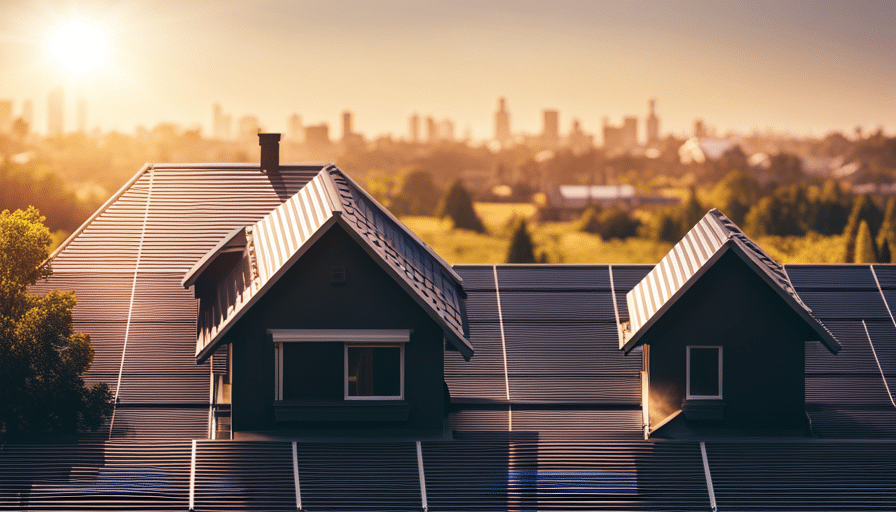As the world moves towards more sustainable and renewable energy sources, solar energy has emerged as a promising alternative to traditional fossil fuels. With advancements in technology, solar panels have become more efficient and cost-effective. However, with the increasing demand for energy, it is essential to explore new and innovative ways to harness solar energy. This is where hybrid solar panels come in.
Hybrid solar panels, also known as photovoltaic-thermal (PVT) panels, combine the benefits of solar thermal and photovoltaic panels. These panels not only generate electricity but also use the heat from the sun to provide hot water or space heating.
In this article, we will explore the advantages of hybrid solar panels, how they work, and what factors you should consider before installing them. By the end of this article, you will have a better understanding of whether hybrid solar panels are the right choice for you.
What Are Hybrid Solar Panels?
Hybrid solar panels, also known as photovoltaic-thermal panels, are innovative devices that produce both electricity and heat simultaneously. These panels are designed to generate electricity through the photovoltaic effect while harnessing the heat generated during the process.
There are two types of hybrid solar panels: water-based and air-based. The water-based panels are usually installed on rooftops and utilize water to absorb heat, while air-based panels are suitable for larger spaces and utilize air for heat absorption.
When comparing the cost of hybrid solar panels with traditional solar panels, it is important to consider the long-term benefits. Hybrid solar panels are more expensive to install than traditional solar panels, but they are more efficient in generating electricity and heat.
The cost of the panels is offset by the savings on electricity bills and the benefits of using renewable energy. Hybrid solar panels are also more durable than traditional solar panels and have a longer lifespan, which makes them a better long-term investment.
Overall, hybrid solar panels offer a great option for those looking to invest in renewable energy sources. They are more efficient than traditional solar panels and offer both electricity and heat generation capabilities. While they are more expensive to install, the long-term benefits offset the initial cost.
Hybrid solar panels are durable and have a longer lifespan, making them a smart investment for homeowners and businesses alike.
How Do Hybrid Solar Panels Work?
Combining two different sources of energy to power your home can be an effective way to maximize output and efficiency. This is where hybrid solar panels come in. These panels are designed to generate electricity from both solar energy and another source of energy, such as wind or fossil fuels. By using multiple sources of energy, hybrid solar panels can provide more consistent and reliable power output than traditional solar panels.
The way hybrid solar panels work is by incorporating a second source of energy into the system. For example, some hybrid solar panels are designed to work in conjunction with wind turbines. In this setup, the solar panels generate electricity during the day, while the wind turbines generate electricity at night or when the weather is cloudy. This ensures that the system is generating electricity consistently throughout the day and night.
The electricity produced by the solar panels and wind turbines is then stored in batteries, which can be used to power homes and businesses.
When it comes to efficiency comparison and cost analysis, hybrid solar panels can be more expensive than traditional solar panels. However, the added cost can be offset by the increased energy output and reliability that hybrid solar panels provide. Additionally, hybrid solar panels can be a good option for those who live in areas with fluctuating weather patterns or areas that experience frequent power outages.
Overall, hybrid solar panels are a viable option for those looking to maximize energy output and efficiency in their homes or businesses.
Advantages of Hybrid Solar Panels
One significant benefit of utilizing two different sources of energy in a hybrid solar panel system is the increased reliability and consistency of power output.
Hybrid solar panels combine the advantages of solar energy and wind energy to provide a more stable and reliable source of power. This is particularly beneficial for regions with unpredictable weather patterns or those prone to natural disasters.
In addition to increased reliability, hybrid solar panels also offer improved energy efficiency. By utilizing both solar and wind energy, hybrid systems are able to generate more power than traditional solar panels alone. This means that homeowners and businesses can generate more energy while using fewer panels, resulting in a more cost-effective solution.
Overall, hybrid solar panels are a promising technology for those looking to invest in renewable energy. With their increased reliability and energy efficiency, they offer a more sustainable and cost-effective solution than traditional solar panels.
As technology continues to advance, it is likely that hybrid systems will become an even more viable option for those looking to reduce their carbon footprint and save money on energy costs.
Considerations Before Installing Hybrid Solar Panels
Before installing a hybrid solar panel system, it is important to consider several factors that can affect its performance, cost effectiveness, and environmental impact.
One of these factors is the location and orientation of the panels. For instance, a solar panel system installed in a location with high levels of solar radiation will generate more electricity than one installed in a location with low levels of solar radiation. Similarly, the orientation of the panels can affect their efficiency, as panels facing south will receive more sunlight than those facing north.
Another important consideration is the amount of available sunlight and wind. Hybrid solar panels are designed to generate electricity using both solar radiation and wind energy. Therefore, the amount of sunlight and wind in a particular location can determine the performance of the system. For example, a hybrid solar panel system installed in a location with high wind speeds will generate more electricity than one installed in a location with low wind speeds. Similarly, the amount of sunlight available can affect the efficiency of the solar panels.
The upfront cost of installation is an important consideration when deciding whether to install a hybrid solar panel system. Hybrid solar panels can be more expensive than traditional solar panels, due to the additional equipment required to generate wind energy. However, they can be cost effective in the long run, as they can generate more electricity and reduce energy bills. Additionally, hybrid solar panels have a lower environmental impact than traditional energy sources, as they generate electricity using renewable energy sources, such as solar and wind.
Maintenance and Upkeep of Hybrid Solar Panels
To ensure the optimal performance of a hybrid solar panel system, it is crucial to regularly inspect and maintain the equipment, including the batteries, inverters, and wind turbines. The maintenance and upkeep of these components are essential for the longevity of the system.
For instance, batteries require periodic cleaning, topping off of fluids, and replacement of worn-out parts to ensure they operate at peak efficiency. Moreover, inverters and wind turbines require routine checks to identify and fix any potential issues before they escalate.
Cleaning tips are an essential aspect of maintaining hybrid solar panels. The buildup of dirt, grime, and debris on the panels can reduce their efficiency and lifespan. It is advisable to clean the panels with soap and water, using a soft-bristled brush or a sponge. Avoid using high-pressure water or abrasive materials that could scratch the surface. Cleaning should be done periodically, depending on the prevailing weather conditions and the level of pollution in the area.
The lifespan expectation of a hybrid solar panel system depends on various factors, such as the quality of the equipment, installation, and maintenance. Generally, hybrid solar panels can last up to 25 years or more if adequately maintained. However, the batteries and inverters may need replacement after 5-10 years, depending on the manufacturer’s recommendations. It is essential to consult with a qualified technician for guidance on the proper care and replacement of the system components to ensure optimal performance and longevity.
Frequently Asked Questions
Are hybrid solar panels more expensive than traditional solar panels?
Hybrid solar panels are typically more expensive than traditional solar panels due to their increased efficiency and added components. However, a cost comparison analysis may reveal that the long-term benefits outweigh the initial investment, making them a worthwhile consideration for those seeking maximum energy output.
Can hybrid solar panels be used in any climate or location?
Hybrid solar panels can be used in a variety of climates and locations, but their efficiency may vary depending on factors such as temperature and sunlight intensity. Additionally, the environmental impact of hybrid panels should be considered when deciding on a solar solution.
Do hybrid solar panels require special installation or equipment?
Hybrid solar panels require specialized installation equipment and maintenance requirements. The installation process involves securing the panels to a stable surface and connecting them to the electrical grid. Regular maintenance is essential to ensure optimal performance and longevity of the system.
How long do hybrid solar panels typically last?
Hybrid solar panels typically have a lifespan of 25-30 years. Longevity analysis suggests that the maintenance cost estimation for these panels is lower than traditional solar panels due to their ability to generate electricity from both solar and wind energy.
Can hybrid solar panels still generate electricity during a power outage?
Hybrid solar panels can generate electricity during a power outage through backup power and generator integration. This feature provides a reliable and sustainable source of electricity, making hybrid solar panels a practical investment for households and businesses.
Conclusion
Hybrid solar panels are an innovative technology that combines the benefits of traditional solar panels with the added advantage of generating electricity from both sunlight and heat. They are an excellent solution for homeowners who want to maximize the efficiency of their solar energy system.
Hybrid solar panels work by using a photovoltaic layer to convert sunlight into electricity and a thermal layer to capture the heat energy from the sun. This dual-layer approach makes hybrid solar panels more efficient than traditional solar panels, especially in regions with high levels of heat and sunlight.
One of the significant advantages of hybrid solar panels is that they can generate electricity even in low-light conditions. This means that they can still produce energy on cloudy days or during the winter months when the sun’s intensity is weaker. Additionally, hybrid solar panels can produce hot water or space heating, making them a versatile choice for homeowners who want to reduce their energy bills further.
Before installing hybrid solar panels, homeowners should consider several factors, such as the size of their home, the amount of sunlight and heat they receive, and the cost of installation. While the initial investment in hybrid solar panels may be higher than traditional solar panels, the long-term savings on electricity bills can outweigh the initial expense.
To maintain and upkeep hybrid solar panels, homeowners should schedule regular cleaning and inspections to ensure that the panels are functioning correctly and to prolong their lifespan.
In conclusion, hybrid solar panels offer many benefits for homeowners who want to reduce their carbon footprint and save money on their energy bills. They are an innovative and efficient technology that can generate electricity and heat from both sunlight and heat, making them a versatile choice for homeowners. With proper maintenance and upkeep, hybrid solar panels can provide clean energy for many years to come.


